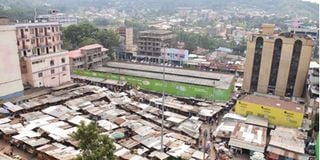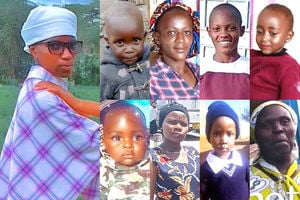Kisii: The beer market that turned into region’s second-biggest town

An aerial view of Kisii town in this picture taken in January 24, 2018.
What you need to know:
- During the colonial era, Indians, Arabs and the British played a big role in the town's growth.
- Devolution has also spurred Kisii's growth with the county government spending millions of shillings in developing the town.
Kisii town, once a one-lane shopping centre with countable buildings, surrounded by steep, heavily forested hills, has progressively grown into a buzzing business centre - the second fastest growing town in Nyanza region after Kisumu.
Kisii was originally known as Getembe. It was a small beer market that got conquered by the British in the late 19th century.
To the northwest of the busy, and sometimes extremely cacophonous town, lies Kiamwasi hill, the home of Otenyo Nyamacharaa, a young man who speared to death the first Kisii district commissioner, who represented the colonial governor on behalf of the Queen of England.
The killing of the DC provoked a vicious and brutal attack by a contingent of colonial forces, with the support of home guards.
After the brutal killing of Otenyo, whose grave has never been located, Getembe was renamed what it is now – Bosongo -- the land of the white.
The construction of an administrative centre near Milimani area and a police station in the centre of town started off the gradual growth of the now expansive town in the highlands east of Lake Victoria.
Before Bosongo became the acceptable business and administrative centre, Boindi, modern-day Riana had become the largest trading centre in South Kavirondo, as Gusii was politically described, following a large group of Indians who found the area conducive for business.
The name Boindi was in reference to the Indians, who were the first to set up businesses in Riana.
Mr Thomas Oresi, who has witnessed the growth of the town from his childhood days up until he served as a councillor for five terms in the late 1970s, said devolution had hastened development.
The 82-year-old Oresi said Indians, Arabs and the British played a big role in the growth of the town.
Rangi Mbili, owned by Arabs, is one of the oldest buildings in town. It reminds residents of the humble beginnings of the town that is now the headquarters of Kisii County.
“Kisii is known as the land of bananas and has in the past seven years of devolution registered tremendous growth. The Rangi Mbili building reminds us how far we have come,” said Mr Oresi.

Thomas Oresi, one of the pioneer traders in Kisii town.
The town got its first tarmac road less than two decades ago but now has several well-constructed roads.
“In the early 80s, we had one murram lane with the Rangi Mbili building being very prominent,” said Mr Oresi.
Most shops, he says, were made of iron sheets, with the Indians and Arabs living behind their shops.

The 'Rangi Mbili' building along Ogembo street, one of the oldest streets in Kisii.

Population explosion
“The whites, who were mostly commissioners and missionaries lived in Milimani estate, which explains why it is still associated with the rich,” said Mr Oresi.
He added: “I was among the first natives to own a shop, which I bought from an Indian.”
The Oresi Sub-county Hospital is named after Mr Oresi for the contribution he made to the health sector in his younger days as an ambulance driver.
“Back the it was prestigious to drive an ambulance and natives as well as the whites trusted me to supply of drugs,” said Mr Oresi.
After the indigenous population started taking over the town in the early 1970s, they encroached on road reserves, which has led to congestion as residents fight for the little available space in the wake of a population explosion.
Mr Oresi’s narration of the town’s growth is corroborated by several economic reports, including the World Bank’s.
The growth is attributed to a combination of factors, such as a conducive climate for economic investment and the strategic location of the town on the highway to Uganda and Tanzania.
A report by the United Kingdom-based Sustainable Urban Economic Development in 2019 ranked Kisii town among the 12 fastest-growing municipalities in Kenya.
Although the town prides itself with growth, economic experts warn that competition for limited resources, such as land, threatens the future stability of the town.
Additionally, the lack of sufficient room for expansion puts the town in jeopardy because existing social amenities will be stretched to accommodate the fast-growing population.

Deputy President WIlliam Ruto addresses a crowd in Kisii town flanked by South Mugirango MP Sylvanus Osoro during a recent tour of the town.
The town faces serious challenges as the land continues to shrink. According to the 2019 census, Kisii County has a population of 1.2 million.
Kisii is among 12 municipalities in which Sustainable Urban Economic Development (Sued) carries out various development programmes.
The programme is funded by the United Kingdom's department of International Development (DFID) and aims at supporting the 12 fast-growing municipalities in Kenya to develop sustainable urban development and economic plans for critical infrastructure.
Central Bank of Kenya (CBK) Governor, Patrick Njoroge, in a past interview said the bank will open a currency centre in Kisii to ease the distribution of cash to financial institutions. Its construction is almost complete.
Dr Njoroge said the decision was informed by high cash circulation in Kisii town, which is expected to serve parts of Rift Valley and Nyanza region. CBK has three branches in Mombasa, Kisumu and Eldoret.
Kisii Governor James Ongwae said the town's growth has placed it t a strategic place in Nyanza region.

The heart of Kisii town along the Kisumu highway where county and national government offices are located.
Major facelift
“Kisii is a cash-rich area and my administration has helped create a conducive environment for investors who have contributed a lot in the county’s economy,” said Mr Ongwae.
More than 10 Level Four health facilities operate within the town alone while others are located in the outskirts.
The new private-owned hospitals have helped decongest the public Kisii Teaching and Referral Hospital, serving about six million people in Kisii, Nyamira, Trans Mara and parts of Bomet, Migori, Kericho and Homa Bay counties.
The increase in health providers has led to more specialists in the region and the communities now rarely seek specialised medical services outside the county.
There are also more than 20 institutions of higher education in Kisii, including public and private universities.
The town also has a vibrant night life with dozens of hotels located in the town.

An aerial view of the Gusii Stadium in Kisii town. The newly-refurbished stadium is home to National Super League side Shabana FC.
Members of the Gusii community in the diaspora have invested heavily in real estate, putting up high-rise apartments.
Dr Matunda Nyanchama, who lived in the US and Canada, serving at one time as chairman of the Abagusii community in the diaspora a few years ago, attributed the fast-paced growth of Kisii town to the heavy investment in property by members of the Abagusii community in the diaspora.
He said 40 per cent of Sh117 billion shillings remitted by Kenyans in the diaspora each year ends up in the county, and that more than half of this is invested in real estate.
Devolution has also spurred Kisii's growth with the county government spending millions of shillings in developing the town.
The World Bank, as well as other organisations are also partnering with the county government to help improve the status of Kisii municipality.
Under devolution, Gusii Stadium has undergone a major facelift, making it suitable for hosting major sporting events in the country.
Street lighting and tarmacking of various roads has also greatly transformed the town.
Roads linking Kisii Police Station with several banks, supermarkets, churches, the Kisii Level Six Hospital and Falcon junction are now in good condition, thanks to the upgrade.





